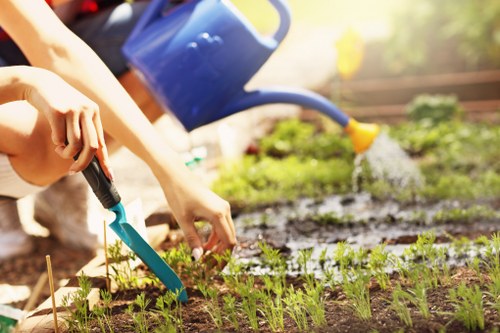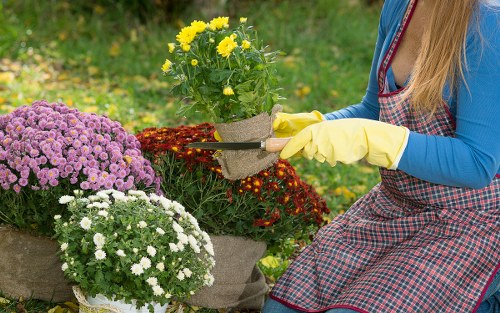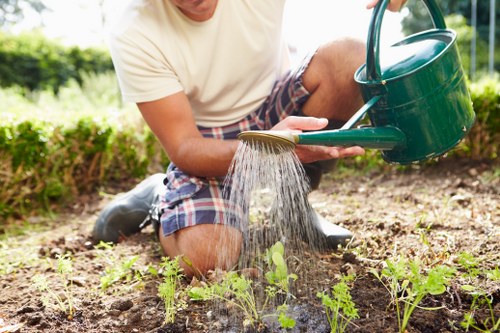Comprehensive Guide to Garden Maintenance in Cleaners SW20
Introduction to Garden Maintenance

Maintaining a **beautiful garden** requires dedication, knowledge, and the right resources. In Cleaners SW20, homeowners understand the value of a well-kept outdoor space not only for aesthetic appeal but also for enhancing property value and providing a relaxing environment. Whether you're a gardening enthusiast or a beginner, regular garden maintenance ensures your green spaces thrive throughout the year.
Effective garden maintenance involves various tasks, from basic lawn care to intricate landscape design. By investing time and effort into these activities, gardeners can prevent common issues such as plant diseases, pest infestations, and weed overgrowth. Additionally, a well-maintained garden can serve as a personal retreat, offering a peaceful place to unwind and connect with nature.
In Cleaners SW20, several local services specialize in garden maintenance, providing tailored solutions to meet diverse gardening needs. These professionals bring expertise and experience, ensuring that every aspect of your garden is meticulously cared for.
Key Components of Garden Maintenance

Successful garden maintenance encompasses a variety of tasks that work together to keep your garden healthy and vibrant. Below are some of the key components:
Lawn Care
Maintaining a lush, green lawn is foundational to any garden. This involves regular mowing, watering, fertilizing, and aerating. Proper lawn care not only enhances the beauty of your garden but also promotes healthy grass growth.
Pruning and Trimming
Pruning is essential for shaping plants, removing dead or diseased branches, and encouraging new growth. Regular trimming of hedges and shrubs ensures a neat and orderly appearance while promoting plant health.
Weed Control
Weeds compete with your plants for nutrients, water, and sunlight. Effective weed control involves manual removal, mulching, and the use of eco-friendly herbicides to minimize weed growth and maintain garden integrity.
Seasonal Garden Maintenance Tips

Gardening requirements change with the seasons. Adapting your maintenance routine to seasonal variations ensures that your garden remains in optimal condition all year round.
Spring Maintenance
Spring is a crucial time for garden upkeep. Activities include clearing debris, preparing soil, planting new flowers and vegetables, and applying fertilizers to give plants a strong start.
Summer Maintenance
During the summer months, focus on regular watering, deadheading flowers, and managing pests. Providing adequate shade and ventilation helps protect plants from excessive heat.
Autumn Maintenance
Autumn involves harvesting mature plants, pruning trees, and preparing the garden for winter. Adding compost and mulch enhances soil fertility and protects roots from cold temperatures.
Choosing the Right Garden Maintenance Services in Cleaners SW20

Selecting a reliable garden maintenance service is essential for achieving the best results. Here are some factors to consider:
- Experience: Look for services with a proven track record and extensive experience in garden maintenance.
- Local Knowledge: Local gardeners understand the specific climate and soil conditions of Cleaners SW20, enabling them to tailor their services accordingly.
- Comprehensive Services: Choose a service that offers a wide range of maintenance tasks, from basic lawn care to specialized pruning and landscaping.
- Customer Reviews: Positive feedback and testimonials indicate a service's reliability and quality.
- Competitive Pricing: Ensure that the service offers fair and transparent pricing without compromising on quality.
Top Garden Maintenance Services in Cleaners SW20
Several reputable garden maintenance companies operate in Cleaners SW20, each offering unique strengths and specialties. Researching and comparing these services can help you find the perfect match for your gardening needs.
DIY vs. Professional Garden Maintenance

Deciding between DIY garden maintenance and hiring professionals depends on various factors, including time, expertise, and the complexity of your garden.
Advantages of DIY Maintenance
- Cost-Effective: DIY maintenance can save money on service fees.
- Personal Satisfaction: Taking care of your garden can be a rewarding and fulfilling hobby.
- Flexibility: You can work on your garden at your own pace and schedule.
Benefits of Professional Maintenance
- Expertise: Professionals have the knowledge and experience to handle complex gardening tasks efficiently.
- Time-Saving: Hiring professionals frees up your time for other activities.
- Quality Results: Professional services ensure a polished and well-maintained garden.
Making the Right Choice
Consider your garden's size, your personal schedule, and your gardening skills when deciding between DIY and professional services. For many in Cleaners SW20, a hybrid approach—handling some tasks personally while outsourcing others—can provide the best of both worlds.
Sustainable Garden Maintenance Practices
Eco-Friendly Techniques
Adopting sustainable practices in garden maintenance helps protect the environment and promotes long-term garden health. Here are some eco-friendly techniques to consider:
- Composting: Recycling garden waste into compost enriches the soil naturally.
- Rainwater Harvesting: Collecting and using rainwater reduces reliance on municipal water sources.
- Organic Fertilizers: Using organic fertilizers avoids harmful chemicals and supports beneficial soil organisms.
- Integrated Pest Management: Combining biological, cultural, and mechanical methods to control pests minimizes environmental impact.
Native Plants
Incorporating native plants into your garden promotes biodiversity and requires less maintenance. Native species are well-adapted to the local climate and soil conditions, making them more resilient and easier to care for.
Benefits of Sustainable Maintenance
- Environmental Protection: Reduces pollution and conserves natural resources.
- Cost Savings: Sustainable practices can lower maintenance costs over time.
- Enhanced Garden Health: Promotes robust plant growth and resilience against pests and diseases.
Embracing sustainability in your garden maintenance routine not only benefits the environment but also ensures a thriving and resilient garden for years to come.
Tools and Equipment for Effective Garden Maintenance
Essential Tools
Having the right tools is crucial for efficient garden maintenance. Here are some essential tools every gardener should have:
- Lawn Mower: Maintains a neat and even lawn.
- Pruning Shears: For precise trimming of branches and stems.
- Garden Fork: Helps in aerating the soil and integrating compost.
- Hand Trowel: Useful for planting and weeding in small areas.
- Watering Can or Hose: Ensures adequate watering of plants.
Advanced Equipment
For larger gardens or more complex tasks, advanced equipment may be necessary:
- Rototiller: Eases soil preparation for planting.
- Hedge Trimmer: Efficiently trims large hedges and shrubs.
- Lawn Aerator: Enhances soil drainage and root growth.
- Electric or Battery-Powered Tools: Reduce manual effort and increase efficiency.
Maintenance of Tools
Regular maintenance of your garden tools ensures their longevity and optimal performance. Clean tools after each use, sharpen blades, and store them in a dry place to prevent rust and damage.
Safety Precautions
Always prioritize safety when using garden tools. Wear appropriate protective gear, follow manufacturer instructions, and handle tools with care to prevent accidents and injuries.
Enhancing Your Garden’s Aesthetic Appeal
Landscaping Ideas
Thoughtful landscaping can transform your garden into a stunning masterpiece. Consider the following ideas to enhance aesthetic appeal:
- Pathways: Create inviting pathways using stone, gravel, or wood to guide visitors through your garden.
- Water Features: Incorporate fountains, ponds, or waterfalls for a soothing atmosphere.
- Lighting: Use ambient lighting to highlight key features and extend garden enjoyment into the evening.
- Plant Diversity: Mix various plant types, colors, and textures to add depth and interest.
- Garden Structures: Add pergolas, arbors, or trellises to provide structure and support climbing plants.
Color Schemes
Choosing the right color palette can significantly impact your garden’s visual appeal. Opt for complementary colors to create harmony or contrasting hues to make a bold statement. Seasonal blooms can add dynamic color changes throughout the year.
Creating Focal Points
Establishing focal points draws attention to specific areas of your garden. This could be a striking plant, a sculpture, or a unique garden feature that serves as the centerpiece of your outdoor space.
Maintenance for Aesthetics
Regular maintenance, such as removing dead plants, trimming overgrown areas, and keeping pathways clear, ensures that your garden remains visually appealing.
Managing Garden Pests and Diseases
Common Garden Pests
Pests can cause significant damage to your garden if not managed properly. Common pests in Cleaners SW20 include aphids, slugs, snails, and caterpillars. Identifying pests early and implementing control measures is crucial for maintaining plant health.
- Aphids: Small insects that suck sap from plants, causing stunted growth.
- Slugs and Snails: Mollusks that feed on leaves and stems, often leaving a slimy trail.
- Caterpillars: Larvae that chew on leaves, defoliating plants.
Preventing Plant Diseases
Plant diseases can spread quickly, leading to extensive damage. Common diseases include powdery mildew, blight, and root rot. Preventative measures include proper watering techniques, ensuring good air circulation, and using disease-resistant plant varieties.
Integrated Pest Management (IPM)
IPM is a sustainable approach to managing pests by combining biological, cultural, and chemical methods. This strategy minimizes environmental impact while effectively controlling pest populations.
Natural Remedies
- Neem Oil: A natural pesticide effective against a variety of pests.
- Beneficial Insects: Introducing ladybugs or predatory beetles to control pest populations.
- Homemade Sprays: Mixing garlic or chili with water to create pest-repellent sprays.
Professional Pest Control
If pest issues become severe, hiring a professional garden maintenance service in Cleaners SW20 can provide targeted and effective solutions to protect your garden.
Soil Health and Fertilization
Understanding Soil Types
Soil health is the foundation of a thriving garden. Different plants require different soil types, so understanding your soil composition is essential for successful gardening.
- Sandy Soil: Drains quickly but has low nutrient retention.
- Clay Soil: Retains nutrients well but can become compacted and poorly drained.
- Loamy Soil: Balanced mixture of sand, silt, and clay, ideal for most plants.
Improving Soil Quality
Enhancing your soil ensures that plants receive the necessary nutrients and support healthy growth. Techniques include adding organic matter, such as compost or manure, and practicing crop rotation to maintain soil fertility.
Fertilization Techniques
Fertilizing provides essential nutrients that may be lacking in the soil. There are two main types of fertilizers:
- Organic Fertilizers: Derived from natural sources like compost, bone meal, and fish emulsion. They improve soil structure and encourage beneficial microorganisms.
- Chemical Fertilizers: Provide immediate nutrient availability but may lead to soil degradation if overused.
Applying Fertilizers
Proper application of fertilizers is crucial to avoid over-fertilization, which can damage plants and pollute water sources. Follow recommended guidelines and consider conducting a soil test to determine specific nutrient needs.
Watering and Irrigation Solutions
Efficient Watering Practices
Proper watering is vital for plant health. Overwatering can lead to root rot, while underwatering stresses plants and inhibits growth. Implementing efficient watering practices ensures that your garden receives the right amount of moisture.
- Early Morning Watering: Reduces evaporation and allows plants to absorb water before the heat of the day.
- Deep Watering: Encourages deep root growth by watering thoroughly but less frequently.
- Mulching: Helps retain soil moisture and regulate temperature.
Irrigation Systems
Investing in an irrigation system can enhance watering efficiency and save time. Common systems include:
- Drip Irrigation: Delivers water directly to the plant roots, minimizing waste.
- Sprinkler Systems: Suitable for larger areas, providing uniform water distribution.
- Soaker Hoses: Allow water to seep slowly into the soil, promoting deep moisture penetration.
Automated Irrigation
Automated systems can be programmed to water your garden at specific times, ensuring consistent moisture levels and reducing the need for manual intervention.
Water Conservation Tips
- Rain Barrels: Collect rainwater for use during dry periods.
- Soil Amendments: Improve soil's water-holding capacity with compost or organic matter.
- Native Plants: Choose drought-tolerant species that require less water.
Enhancing Garden Biodiversity
Importance of Biodiversity
A diverse garden supports a wide range of species, promoting ecological balance and resilience. Biodiversity enhances plant health, attracts beneficial insects, and supports wildlife.
Plant Selection
Choosing a variety of plants, including flowers, shrubs, and trees, creates habitats for different organisms. Incorporate both native and pollinator-friendly plants to encourage a thriving ecosystem.
- Pollinator Gardens: Attract bees, butterflies, and other pollinators with nectar-rich flowers.
- Bird-Friendly Plants: Provide food and shelter for birds, contributing to pest control.
- Beneficial Plants: Include species that repel pests or attract beneficial insects.
Creating Wildlife Habitats
Designate areas of your garden to support wildlife, such as installing birdhouses, bat boxes, and insect hotels. Providing water sources like birdbaths or small ponds also attracts various species.
Benefits of a Biodiverse Garden
- Pest Control: Natural predators help manage pest populations.
- Pollination: Enhanced pollinator activity improves plant reproduction.
- Soil Health: Diverse plant roots improve soil structure and fertility.
Maintaining Biodiversity
Regular garden maintenance, such as avoiding excessive pesticide use and providing continuous blooming plants, helps sustain biodiversity over time.
Planning and Designing Your Garden
Garden Layout
A well-planned garden layout maximizes space, enhances functionality, and creates visual harmony. Consider the following elements when designing your garden:
- Space Utilization: Allocate areas for different plant types, seating, and pathways.
- Scale and Proportion: Choose plants and structures that complement the garden size.
- Focal Points: Incorporate key features to draw attention and add interest.
- Flow and Movement: Ensure easy navigation through the garden with well-placed paths and transitions.
Choosing Plant Varieties
Select plants that thrive in Cleaners SW20’s climate and soil conditions. Consider factors like sunlight exposure, water requirements, and growth habits to ensure successful cultivation.
Color Coordination
Plan your garden’s color scheme to create a cohesive and attractive display. Use a mix of vibrant and muted colors to achieve balance and variety.
Incorporating Seasonal Plants
Include plants that bloom in different seasons to maintain year-round interest. This approach ensures continuous color and texture, enhancing the garden’s visual appeal.
Budget-Friendly Design Tips
- Start Small: Begin with a manageable area and expand as you gain experience.
- Reuse Materials: Use reclaimed wood, stones, and other materials to reduce costs.
- Plan for Growth: Choose plants that won't outgrow their space, saving you from future replanting expenses.
Professional Design Services
For those seeking expert guidance, professional garden design services in Cleaners SW20 can help bring your vision to life. These professionals offer creative solutions and tailored designs to meet your specific preferences and needs.
Collaborating with Designers
Work closely with garden designers to communicate your ideas, preferences, and budget. Their expertise ensures a functional and aesthetically pleasing garden layout.
Finalizing Your Plan
Once the design is finalized, create a maintenance schedule to keep your garden aligned with the planned layout and health standards. Regular updates and adjustments may be necessary to adapt to changing conditions.
Conclusion and Next Steps
Maintaining a Thriving Garden in Cleaners SW20
Garden maintenance is a rewarding endeavor that enhances your living environment and provides a sanctuary for relaxation and recreation. By understanding the key components, implementing sustainable practices, and utilizing professional services when needed, you can ensure your garden remains healthy and beautiful throughout the year.
Start Today
Don’t wait to transform your garden into a lush, vibrant space. Whether you're starting from scratch or looking to improve an existing garden, the right maintenance strategies and professional support can make all the difference.
Contact Garden Maintenance Experts
For personalized garden maintenance services in Cleaners SW20, contact us today to schedule a consultation. Let our experienced team help you achieve the garden of your dreams.
Book your service now and take the first step towards a stunning, well-maintained garden that you can enjoy year-round.


